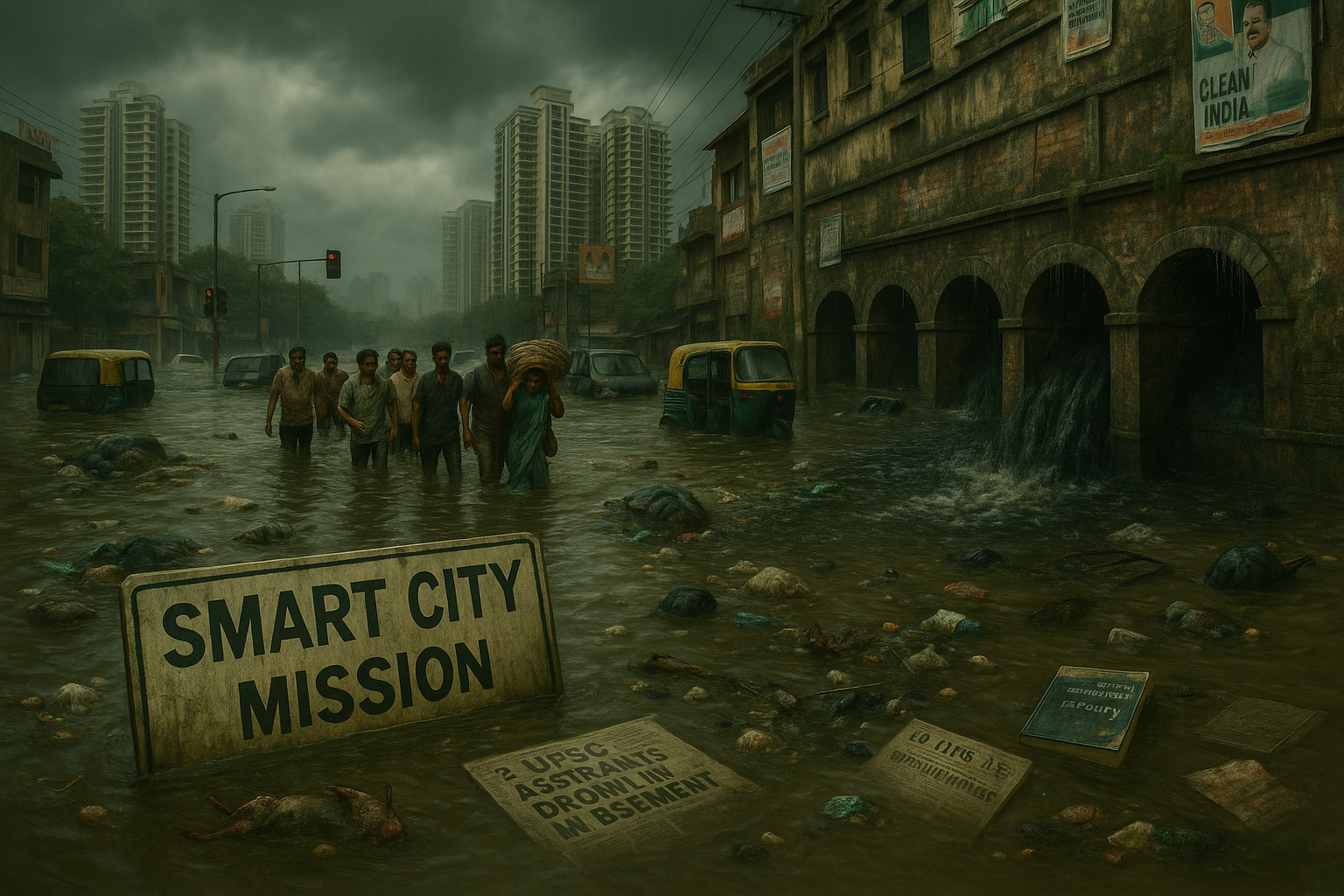 💧 A Nation Sinking in Its Own Waste
💧 A Nation Sinking in Its Own Waste
Even after 75 years of independence, over 70% of Indian cities lack basic sewage and garbage disposal systems. Cities with billion-dollar valuations, skyscrapers, and “smart city” tags cannot move water off their streets during rains.
Why? Because India doesn’t just have a drainage crisis—it has a governance catastrophe.
Delhi’s drains, meant for 38 million people, serve only half that number. Bengaluru, which generates 1,800 million litres of sewage daily, treats just 30%. The rest flows into streets and lakes.
Mumbai’s 160-year-old British-era drainage system gasps under 22 million bodies and billions in real estate greed. And when disaster strikes—as it did in Old Rajendra Nagar in July 2024—it kills not just bodies, but dreams.
Three young aspirants, preparing for the civil services, drowned in a flooded basement. The country never noticed.
🌪️ When the System Itself Is the Killer
Let’s be clear: this is not just poor planning—it’s systemic betrayal. Cities have turned rivers into sewage dumps. The Yamuna carries 2.9 billion litres of untreated waste daily.
Mumbai’s Mithi River has been narrowed by over 50% due to slums and encroachments.
Bengaluru’s Vrishabhawathi is now a black river of corporate sewage. Of India’s 603 assessed rivers, 46% are severely polluted, as per a 2025 report.
Floodplains have been devoured by highways, malls, and luxury apartments. Wetlands, nature’s own flood buffers, have been erased.
Since 1990, India has lost 40% of its wetlands. Chennai’s Pallikaranai marsh, once 5,500 hectares, is now a tenth of that, sacrificed for airport expansions. And when the rains come, the water has nowhere to go—except into people’s homes, lungs, and coffins.
💸 The Price of Progress? Blood and Bribes
Corruption is the rot that drowns us. Desilting contracts worth ₹1,500 crore in Mumbai went to shell companies. Delhi’s ₹3,000 crore sewerage plan is stalled, its funds leaking like the city’s pipes.
Bengaluru’s AMRUT scheme met only 20% of its sewage targets—allegedly due to kickbacks and contractor-politician nexuses. The Namami Gange project, with ₹32,000 crore pumped in since 2014, has 68% of its sewage treatment plants non-functional.
While the elite race across global cities, the poor in India wade through filth and disease. In slums, where only 5% have piped water, life is reduced to a slow death.
🚨 Lessons from the World—and from Ourselves
Cities like Tokyo, Singapore, and New York have built systems to capture, clean, and reuse water. India, meanwhile, captures headlines—of avoidable death. Tokyo’s underground flood tanks can store 13 million gallons. New York’s drainage network is 10,600 km long and smart-monitored. Singapore’s green roofs and swales mimic nature. India builds expressways through floodplains and calls it development.
But hope glimmers: Indore’s waste model and Meghalaya’s Umngot River protection show transformation is possible. It demands rage. It demands reform. It demands accountability.
🔥 This is Not Climate Change. This Is Civic Collapse.
Each death in the floods is a murder by neglect. Each overflowing drain is an indictment of the state. Each lost dream is a reminder that urban India is not drowning—it’s being drowned.
So here’s what we must demand—today, not tomorrow:
- Separate stormwater and sewage networks.
- Enforce river reserve zones.
- Restore wetlands like Pallikaranai and the Ganga’s floodplains.
- Jail corrupt officials and contractors.
- Upgrade infrastructure with citizen oversight, not just cement.
When the rains return, will we still pretend this is fate? Or will we rise—with fists, with votes, with voices—to ensure this flood is the last?


